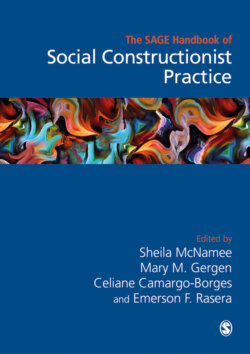Читать книгу The Sage Handbook of Social Constructionist Practice - Группа авторов - Страница 56
На сайте Литреса книга снята с продажи.
The Collaborative Turn and the Growing Jungle of ‘Co's’
ОглавлениеThroughout the last decades, collaboration and active citizen participation have been increasingly endorsed as essential approaches to address complex societal problems and promote human flourishing across a wide range of practices and academic disciplines (Bradbury, 2015; Cottam, 2018; Hersted et al., 2020; Ostrom, 1996; Pestoff, 2019; Voorberg et al., 2015).
Indeed, participatory and collaborative approaches and concepts are not new, especially because they have always been the focus of social constructionist theory and practice. In social constructionist theory, the term ‘co-construction’ has a long history and is used to describe processes of relational meaning-making and joint action (Gergen, 1985, 1994, 2009; McNamee, 2010; Shotter, 1993). However, the expansion of attention to such concepts and the language used for meaning-making around these have most certainly come from the public sector. Many of these emerging discourses have been constructed and described through a language of ‘co's’ (Phillips and Napan, 2016). This development may be considered a reaction to societal development heavily dominated by neoliberal and positivist ideas, where individualism and fragmentation have been key tendencies (Gergen, 2009, 2014; Selloni, 2017).
The expansion of parallel worlds of ‘co's’ in a series of academic and practice discourses (e.g., public administration and policy, organizational studies and design thinking) can be described as co-constructed through terms such as ‘co-creation’, ‘co-production’, ‘collaborative governance’ and ‘co-design’. Most of these co's have mainly focused on descriptions of processes aimed at achieving desired outcomes, not on the process of co-constructing knowledge or evaluating or having dialogues about outcomes (e.g., Voorberg et al., 2015). In this chapter, we will not go into detail about these numerous concepts of ‘co's’ and the academic struggle to coin and further develop them. Instead, we acknowledge the commonality of collaboration, participation and empowerment as central concepts in the developing pluralism of ‘co's’ and as key issues in addressing the complex societal problems described above.
